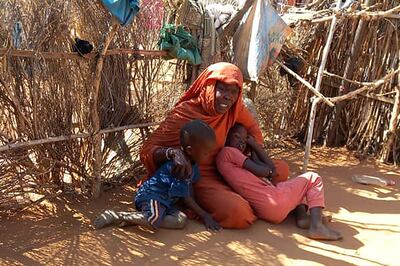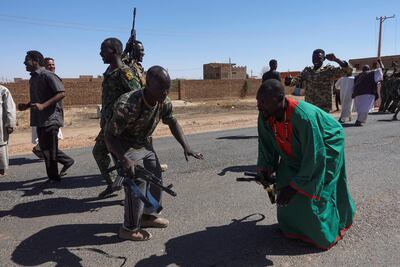Sudanese army troops and allied militiamen were rapidly advancing in the capital on Wednesday, engaging the rival paramilitary Rapid Support Forces in street combat in residential areas once home to hundreds of thousands of citizens before the war broke out 21 months ago.
Witnesses said the fighting was mostly in Bahri, one of three cities on the Nile that make up the capital's greater region, and where the army and its allies have been fighting a battle against the RSF for the past week. The other two cities are Khartoum and Omdurman.
The Sudanese military said in a brief statement on Wednesday that troops accompanied by members of a militarised police force called the "central reserves" were advancing on the Bahri end of Al Mk Nemer Bridge that leads into Khartoum. If they capture the bridge, they will be only several hundred metres from the RSF-held presidential palace and several ministries in central Khartoum.
A video clip shared online showed two soldiers standing on the Bahri side of the bridge, but The National could not immediately verify its authenticity.
The witnesses said the army and allies, mostly Islamists who are former members of militias loyal to ousted president Omar Al Bashir, have advanced from various directions into the centre of Bahri, retaking the strategic district of Shambat and the historic quarter.
They have also recaptured a key army paratrooper base in Shambat, which had been used by the RSF as a medical centre. A video clip shared online purported to show an army soldier using a knife to tear up an RSF sign outside the base.
Other footage showed troops firing in the air to celebrate and a soldier making a call to prayer outside a badly damaged mosque in Bahri.

The witnesses said RSF snipers were continuing to menace the troops as they advanced in Bahri. They resorted to close-range combat inside high rises where the snipers had taken up firing positions.
"Several districts were combed today as well as the capture of strategic locations, including the paratroopers base, the Bahri police headquarters and the direction of the Al Mk Nemer bridge on the Blue Nile," said Abdel Monaim Khogali, commander of a volunteer brigade fighting in Bahri.
"We saw fighters from the Rapid Support Forces escape in boats to [the Nile island of] Tuti. We caught some of them and handed them over to military intelligence," he added.
Armed forces chief Gen Abdel Fattah Al Burhan said on Sunday his troops would throw the RSF out of the whole of Bahri within days, then head to Omdurman and Khartoum, both of which remain mostly in the hands of the RSF.
The witnesses said there was some fighting in Omdurman on Wednesday, but with neither side making any tangible progress.
However, the army's recent battlefield gains in the capital are significant, including last week's recapture of the armed forces headquarters in Khartoum, breaking the siege of the Signals Corps in Bahri and retaking a major oil refinery north of the city where the paramilitary had kept a large contingent of fighters.
The war broke out in April 2023 when the rivalry between Gen Al Burhan and his one-time ally Gen Mohamed Dagalo, the RSF commander, boiled over into violence. The pair are competing to dominate the vast and resource-rich Afro-Arab nation, where the civil war has killed tens of thousands and forced more than 10 million people to flee their homes, three million of whom left Sudan.
The fighting has created the world's most serious humanitarian crisis, with 26 million, more than half the country's population, facing acute hunger and pockets of famine surfacing in various parts of Sudan.
Both Gen Al Burhan and Gen Dagalo stand accused of war crimes by the UN and international rights groups. They were sanctioned by the US government in the final days of President Joe Biden's administration earlier this month. However, the pair insist they are fighting to defend Sudan and its people.

Away from the capital area, about 4,000 families have fled their homes in North Darfur state this week to escape intensified attacks by the RSF and its tribal allies, the UN migration agency has reported.
The families are from villages around the heavily contested state capital of El Fasher, where the RSF and the armed forces and their respective allies have been locked in battle since May 2023, the International Organisation for Migration (IOM) said in a statement.
The RSF has captured every state capital in the vast western Darfur region, except El Fasher.
The IOM said the displacement was caused by RSF attacks, which included reported incidents of “looting and burning of personal property”.
On Friday, a drone attack on the city's only functioning hospital, which Sudanese monitors blamed on the RSF, killed 70 people, drawing condemnation from the UN.
Nearly 1.7 million people are displaced in North Darfur state alone, according to the UN, with an estimated two million experiencing extreme food insecurity and 320,000 enduring famine.
Darfur is the birthplace of the RSF's forerunner, the notorious Janjaweed militia, which fought on the side of Al Bashir's government in the 2000s to crush a revolt by ethnic Africans demanding more political and economic equity. That war left about 300,000 dead and displaced another 2.5 million.
Al Shafie Ahmed reported from Kampala, Uganda

